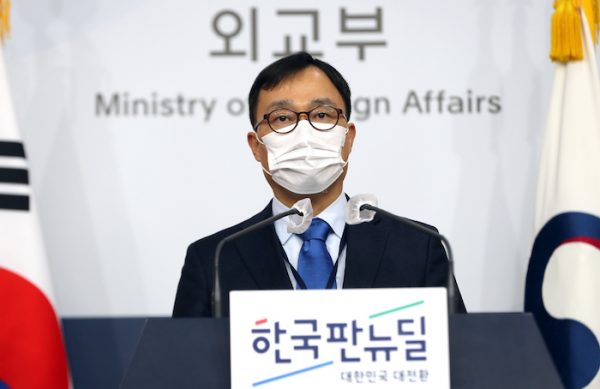In 2018, Donald Trump unilaterally withdrew the United States from the Iran nuclear deal (the Joint Comprehensive Plan of Action, or JCPOA), thereby straining the US–Iran relationship. Though the United States suffers relatively limited damage from breaking ties with Iran, the situation is different for South Korea.
South Korea is one of many countries whose relations with Iran became uncomfortable due to US sanctions. Iran was once South Korea’s biggest trade partner in the Middle East, and in 2010 the two countries established a South Korean currency-based settlement system to avoid the risk of sanctions on US dollar transactions. This allowed Iran to export crude oil to South Korea and use the proceeds to pay for South Korean imports. From 2015 to 2018, South Korea was Iran’s third largest import partner.
But in 2019 the settlement account was frozen due to US sanctions, making it difficult for South Korea to export to Iran and leaving US$7 billion of Iranian oil money stuck in South Korean banks. The Iranian government has repeatedly requested the funds be delivered, but South Korea is unable to do so without violating US sanctions. South Korea’s exports to Iran decreased by 88.6 per cent, the largest drop among Iran’s top 20 importers.
South Korea and Iran have developed a mostly amicable relationship since the establishment of diplomatic relations in 1962, with the exception of the 1980s. With the Iranian Revolution of 1979, Iran shifted from a pro-US to an anti-US stance. During the Iran–Iraq War from 1980 to 1988 the country was supported by North Korea, leading to an enhanced political and military alliance between the two countries. This resulted in an uncomfortable relationship with South Korea, which in 1981 downgraded its ambassador to Iran to charge d’affaires.
South Korea normalised diplomatic relations by restoring full ambassadorship in 1989, resulting in intense economic exchange. South Korean President Park Geun-hye’s 2016 visit to Iran, the first since the establishment of diplomatic relations, was an historic event. Iran’s Look East Policy has also strengthened relations with South Korea, and Mellat Bank in Seoul is the only Iranian bank in East Asia.
The countries’ friendship is symbolised in a series of namesakes: Tehran Street is the only street in South Korea named after a foreign city, just as Seoul Park is the only park in Iran named after a foreign city.
Iran is a major export destination for the Korean Wave. Islamic Republic of Iran Broadcasting aired South Korean dramas Jewel in the Palace in 2007 and Jumong in 2009, reaching 86 and 60 per cent viewer ratings respectively. LG Electronics selected Song Il-guk, the lead from Jumong, as an advertisement model and invited him to Iran to conduct Korean Wave marketing activities.
Iranians have developed a sense of intimacy with Korean culture. Both Asian countries share cultures that value family and respect elders. Like South Korea, Iran has a history of resisting invaders. But because of such experiences, Iran tends to dislike powerful nations.
There is the possibility of change in the US–Iran relationship under US President Joe Biden. Biden served as vice president in the Obama administration, which regarded the JCPOA as one of its greatest diplomatic achievements. The Trump administration likely withdrew as a way of erasing Obama’s legacy, so its restoration will be a priority for Biden.
The JCPOA was finalised between Iran and the five permanent members of the UN Security Council and Germany (P5+1) in a phased approach. Although the Trump administration withdrew unilaterally, other signatories — the United Kingdom, France, Germany, Russia and China — are eager to maintain the agreement.
Restoring the deal implies a respect for multilateral diplomacy, the basis of Biden’s foreign policy, and would assist with the recovery of US relations with Europe. Improving relations with Iran would also allow the United States to focus its diplomatic attention on China amid the intensification of US–China rivalry.
The stoush in the Strait of Hormuz is an important event that will determine the future of the South Korea–Iran relationship. The simplest way to realise a swift resolution depends on the United States — the issue of frozen Iranian funds in South Korea is closely related to the US sanctions against Iran, so it can only be solved in the process of lifting these sanctions. South Korea must actively play the role of mediator in US–Iran relations, with the restoration of the JCPOA the primary goal.
Dal Seung Yu is Professor of Iranian Studies at Hankuk University of Foreign Studies (HUFS) and President of the Korean Association of the Middle East Studies.


The solution surely depends on the the exercise of South Korea’s sovereignty not to work as a puppet — it is clear that South Korea’s sovereignty is owned and over-ridden by the U.S.